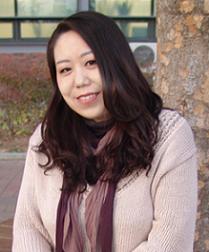 1. Could you introduce yourself?
1. Could you introduce yourself?Hello Keimyung students! My name is Rie Miyata, but everybody calls me Rie.
As a senior student at the faculty of East Asian Languages and Cultures, I major in Korean, at Baiko Gakuin University, Shimonoseki, Yamaguchi-hyun, Japan. Now I a an exchange student, so I usually attend at the Department of Japanese Language and Literature in Keimyung University.
2. Would you tell us why you came to Korea and why you chose Keimyung University?
Baiko Gakuin University and Keimyung University are sister schools, so I found they mutually dispatch students through an exchange program every year. In Japan, when students are mostly sophomores or juniors, they can be dispatched to Korea through the Local-semester system, and that's why I 'm here.
3. Please introduce Japan briefly and could you tell us what are differences between universities in Japan and Korea?
As everyone knows, Japan is a country of islands and we eat a lot of delicious seafood. If you go to Japan, you can eat fresh Japanese raw fish. Each part of Japan has many beautiful hot-springs, which are very good for skin. If you get to experience Japanese spas, you can feel the effect. For the differences between Korean and Japanese universities, first, I felt very shocked to learn that Korea has midterm examinations. In Japan, we don't have any midterm exams. In addition, it was very impressive that students here study much harder during exam times compared to in Japan.
4. What were the hardest things for you during your stay in Korea?
As I expected, it was the language problem, I haven't got fully acquainted with Korean. In particular, I had difficulty in pronunciation. However, I try to improve it again and again. In addition, during initial my early stay period in Korea, I did not know the names of the necessities of life in Korean at all, so it was difficult to buy them. For example, when I wanted to buy some dry batteries (in Korean, Gunjeonji), I had no idea how to call them in Korean, so I had to explain it by gesturing. From that day to until now, I have brought a dictionary with me when shopping.
5. What were the amazing or wonderful things about Korea?
In fact, I was happy to experience Korean culture. In Chuseok, I went to my friend's house, and I saw a Korean traditional ancestor-memorial ceremony, and I also saw a Korean traditional wedding ceremony. What was really surprising was that if something comes into fashion, then many people follow the trend, by mimicking those days' styles of famous actors or singers. I think that this is because of the effect of televisions and the Internet. It is almost like in Japan in this way. I was amazed to find the Internet diffusion rate and the coefficient of utilization are so high compared with Japan. I am envious of the convenience.
6. What do you want to achieve during your stay in Korea and could you please tell something to Keimyung students?
I am to graduate from university next Match, so I made a plan to study Japanese to become a Japanese teacher. If I teach Japanese very well to students, I am sure I will feel happy. Another plan of mine is to studying Japanese in graduate school. Finally, I would like to convey a message to Keimyung students. I recommend you need to endeavor to do whatever you need to do. For example, Keimyung students can meet many students from overseas countries, so you can learn many languages. Speaking without any restraint to your foreigner friends can open up your world.








